As the Iranian leadership prepares to engage in negotiations with the five permanent members of the United Nations Security Council plus Germany (P5+1), the conversation inside Iran has moved beyond the nuclear issue to include a debate about the utility of or need for engaging in direct talks, even relations, with [...]]]>
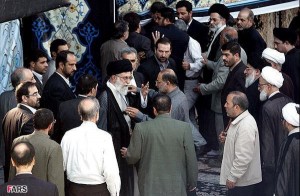 As the Iranian leadership prepares to engage in negotiations with the five permanent members of the United Nations Security Council plus Germany (P5+1), the conversation inside Iran has moved beyond the nuclear issue to include a debate about the utility of or need for engaging in direct talks, even relations, with the United States.
As the Iranian leadership prepares to engage in negotiations with the five permanent members of the United Nations Security Council plus Germany (P5+1), the conversation inside Iran has moved beyond the nuclear issue to include a debate about the utility of or need for engaging in direct talks, even relations, with the United States.
Public discussions about relations with the US have historically been taboo in Iran. To be sure, there have always been individuals who have brought up the idea, but they have either been severely chastised publicly or quickly silenced or ignored. The current conversation is distinguished by its breadth as well the clear positioning of the two sides on the issue.
On one side are the hard-liners who continue to tout the value of a “resistance economy” – a term coined by the Leader Ali Khamenei — in the face of US-led sanctions. On the other side is an increasing number of people from across the political spectrum, including some conservatives, who are calling for bilateral talks.
The idea of direct talks with the US was openly put forth last Spring by Akbar Hashemi Rafsanjani, former president and current chair of the Expediency council, through a couple of interviews. He insisted that Iran “can now fully negotiate with the United States based on equal conditions and mutual respect.” Rafsanjani also conceded that the current obsession with Iran’s nuclear program is not the US’ main problem, arguing against those who “think that Iran’s problems [with the West] will be solved through backing down on the nuclear issue.” At the same time, he called for proactive interaction with the world, and for understanding that after recent transformations in the Middle East, “the Americans… are trying to find “new models that can articulate coexistence and cooperation in the region and which the people [of the region] also like better.” Rafsanjani added that the current situation of “not talking and not having relations with America is not sustainable…The meaning of talks is not that we capitulate to them. If they accept our position or we accept their positions, it’s done.”
In Rafsanjani’s worldview, negotiations over Iran’s nuclear program are merely part of a process that will eventually address other sources of conflict with the US in the region.
Rafsanjani is no longer the lone public voice in favor of direct talks. In fact, as the conversation over talks with the US has picked up, he has remained relatively quiet. Instead, Iranian newspapers and the public fora are witnessing a relatively robust conversation. Last week, for instance, hundreds of people filled an overcrowded university auditorium in the provincial capital of Yasuj, a small city of about 100,000 people, to listen to a public debate between two former members of the Parliament over whether direct talks and relations with the US present opportunity or threats.
On one side stood Mostafa Kavakabian who said
…whatever Islamic Iran is wrestling with in [terms of] sanctions, the nuclear energy issue, multiple resolutions [against Iran] in [international] organizations, human rights violations from the point of view of the West, the issue of Israel and international terrorism is the result of lack of logical relationship, with the maintenance of our country’s principles, with America.
Sattar Hedayatkhah on the other hand argued that “relations with America under the current conditions means backtracking from 34 years of resistance against the demands and sanctions of the global arrogance.”
In recent weeks the hard-line position has been articulated by individuals as varied as the head of the Basij militia forces, Mohammadreza Naqdi, who called sanctions a means for unlocking Iran’s “latent potential” by encouraging domestic industry and ingenuity, and the leader’s representative in the Revolutionary Guard (IRGC), cleric Ali Saeedi, who said that Washington’s proposals for direct talks are a ploy to trick Tehran into capitulating over its nuclear program.
Standing in the midst of this contentious conversation is Leader Khamenei, who, as everyone acknowledges, will be the ultimate decision-maker on the issue of talks with the US. During the past couple of years he has articulated his mistrust of the Obama Administration’s intentions in no uncertain terms and since the bungled October 2009 negotiations over the transfer of enriched uranium out of Iran — when Iran negotiator Saeed Jalili met with US Undersecretary of State for Political Affairs William Burns for the P5+1 side of the meeting — has not allowed bilateral contact at the level of principals between Iran and the US.
Yet the concern regarding a potentially changed position on his part has been sufficient enough for the publication of an op-ed in the hard-line Kayhan Daily warning against the “conspiracy” of “worn-out revolutionaries” to force the Leader “to drink from the poison chalice of backing down, abandoning his revolutionary positions, and talking to the US.” The opinion piece goes on to say that
…by offering wrong analyses and relating all of the country’s problems to external sanctions, [worn-out revolutionaries] want to make the social atmosphere inflamed and insecure and agitate public sentiments so that the exalted Leader is forced to give in to their demands in order to protect the country’s interests and revolution’s gains.
The idea of drinking poison is an allusion to Revolution-founder Ruhollah Khomeini’s famous speech wherein he grudgingly accepted the ceasefire with Iraq in 1988 and refered to it as poison chalice from which he had to drink. Hard-liners in Iran continue to believe that it was the moderate leaders of the time such as Rafsanjani who convinced Khomeini to take the bitter poison, while conveniently omitting the fact that the current Leader Khamenei was at the time very much on Rafsanjani’s side. This time around it is the “worn-out revolutionaries” who, in the mind of the hard-liners, despite being conservative and acting as key political advisors to Khamenei or holding key positions in office, are suspected of pressuring him to accede to talks.
Basirat, a hard-line website affiliated with the IRGC’s political bureau, has taken a different tact and instead of denouncing pressures on Khamenei, has published a list of “Imam” Khamenei’s statements which insist on long-standing enmity with the US. Presumably, the intended purpose is to make it as hard as possible for him to back away from those statements.
The hard-liners face a predicament, which is essentially this: Having elevated Khamenei’s role to the level of an all-knowing Imam-like leader, they have few options but to remain quiet and submit to his leadership if he makes a decision in favor of direct talks. Hence their prior moves to portray any attempt at talks as capitulation at worst, or unnecessarily taking a bitter pill at best.
It is in this context that one has to consider Khamenei’s potential decision over the issue of direct talks. Whether he will eventually agree to them is not at all clear at this point and in fact is probably quite unlikely, unless the US position on Iran’s nuclear program is publicly clarified to include allowance for limited enrichment inside Iran.
In other words, while Khamenei may eventually assent to direct talks, the path to that position requires some sort of agreement on the nuclear standoff — even if only a limited one — within the P5+1 frame and not the other way around.
The reality is that US pressure on Iran has helped create an environment in which many are calling for a strategic, even incrementally implemented, shift of direction in Iran’s foreign policy regarding the so-called “America question.” But this call for a shift can only become dominant if there are some assurances that corresponding, and again, even incrementally implemented shifts, are also in the works in the US regarding the “Iran question.
- Farideh Farhi is an independent researcher and an affiliate graduate faculty member in political science and international relations at the University of Hawaii-Manoa. A version of this article appeared on IPS News.
]]>By Michael Brenner
Graham Allison and Shai Feldman, the two distinguished authors of the “Coming Clash over Iran“, have reduced the complicated, contentious issue of Iran’s relations with the United States to the tenor of dealings between Washington and Jerusalem. Means, methods and strategies for “keeping them on the same [...]]]>
By Michael Brenner
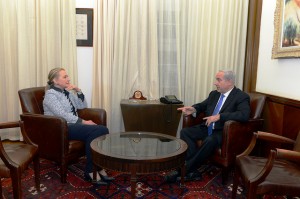 Graham Allison and Shai Feldman, the two distinguished authors of the “Coming Clash over Iran“, have reduced the complicated, contentious issue of Iran’s relations with the United States to the tenor of dealings between Washington and Jerusalem. Means, methods and strategies for “keeping them on the same page” is, they suggest, the priority concern. In so doing, they have demonstrated the problem while adding nothing to the search for a solution.
Graham Allison and Shai Feldman, the two distinguished authors of the “Coming Clash over Iran“, have reduced the complicated, contentious issue of Iran’s relations with the United States to the tenor of dealings between Washington and Jerusalem. Means, methods and strategies for “keeping them on the same page” is, they suggest, the priority concern. In so doing, they have demonstrated the problem while adding nothing to the search for a solution.
They begin with the odd proposition that “the two country’s leaders seemed to be able to set aside their mutual animosity and distrust, working together to defuse the crisis” in Gaza. What they did in fact was collaborate to create the crisis. Then, when their plans went awry, they hopped on the Morsi bandwagon so as to cut their losses. In the process, they strengthened Iran’s hand.
The glaring truth is that to the extent that President Barak Obama accommodates Prime Minister Binyamin Netanyahu, the chances of a settlement with Tehran go down. The prerequisites for finding a modus vivendi are two-fold. One is for the Obama administration to make an independent, sober assessment of American stakes in its relations with Iran and to set that as the reference mark for fashioning policies to secure them. The other is to recognize that only a comprehensive approach that embeds the nuclear issue in discussions of wider security concerns holds out the prospect of success. Unhappily, there is no evidence as yet that we have begun to proceed accordingly.
– Michael Brenner is Professor Emeritus of International Affairs at the University of Pittsburgh and a Fellow of the Center for Transatlantic Relations SAIS Johns Hopkins. His commentaries appear regularly in the Huffington Post and a number of news outlets elsewhere in the world.
]]>Academics Graham Allison and Shai Feldman predict a “Coming Clash over Iran” between the United States and Israel in the National Interest. Significant developments during the next 6 months — further Iranian nuclear progress; potential reinvigorated attempts at diplomacy by the US and Iran; more Israeli apprehension [...]]]>
Academics Graham Allison and Shai Feldman predict a “Coming Clash over Iran” between the United States and Israel in the National Interest. Significant developments during the next 6 months — further Iranian nuclear progress; potential reinvigorated attempts at diplomacy by the US and Iran; more Israeli apprehension about Iran’s nuclear program; and an Israeli election that may result in an even more right-wing Israeli leadership — may result in further strain in US-Israel relations over the Iran issue. The authors accordingly discuss how the two countries can avoid further strain, such as by agreeing on “rules of engagement” for conducting future dialogue about Iran:
…Specifically, they should agree to avoid the kind of public squabble on Iran in which they were engaged before the U.S. elections. Instead, their discussions of this issue should follow the quiet manner in which Prime Minister Ehud Olmert and President George W. Bush dealt with Syria’s nuclear reactor, destroyed in 2007.
A subtle caveat is found in the conclusion:
Despite the depth and breadth of the U.S.-Israeli alliance, each is a separate national state with its own national interests. Each has a democratically-elected government that is responsible for protecting its nation’s vital interests as it sees them. And neither can be expected to subcontract its survival to the other.
]]>
According to former top advisers to George W. Bush and Barak Obama, the United States will preventively strike Iran in 2013 if no diplomatic settlement is reached over its nuclear program. From the Times of Israel:
During an on-stage discussion with Dennis Ross and Elliott Abrams halfway through the [...]]]>
 According to former top advisers to George W. Bush and Barak Obama, the United States will preventively strike Iran in 2013 if no diplomatic settlement is reached over its nuclear program. From the Times of Israel:
According to former top advisers to George W. Bush and Barak Obama, the United States will preventively strike Iran in 2013 if no diplomatic settlement is reached over its nuclear program. From the Times of Israel:
During an on-stage discussion with Dennis Ross and Elliott Abrams halfway through the evening, Washington Institute director Robert Satloff asked the former officials, “Will either America or Israel employ preventive military action against Iran’s nuclear program – yes or no?”
The two replied in unison, “yes.”
“Will this happen in 2013?” Satloff pressed.
“Yes,” said Ross.
“Yes, I agree,” added Abrams.
Last week the International Atomic Energy Association (IAEA) said Iran could be referred to the United Nations Security Council if it had “not begun substantive cooperation with the IAEA” by March 2013. This caused Micah Zenko to speculate about a deadline for a US attack, while others suggested the path is simply being prepared for another resolution.
Some well-informed Iran watchers are saying that Ross and Abrams’ prediction is on par with that of White House insiders. Whether that’s true or not, it’s undeniable that pressure will be very high on Obama to ‘do more’ if no headway is made with Iran in the next 6 months.
But according to Zenko, deadlines, while helpful on the pressure-front, can also be detrimental:
]]>Setting a March deadline provides some certainty and perhaps coercive leverage to compel Iran to cooperate with the IAEA. But declaring deadlines also places U.S. “credibility” on the line, generating momentum to use force even if there is no new actionable intelligence that Iran has decided to pursue a nuclear weapon. Based on what we know right now, that would be a strategic miscalculation.
According to Ambassador Seyed Hossein Mousavian, the spokesperson for Iran’s nuclear negotiating team (2003-2005) and now a visiting scholar at Princeton University, an Iranian nuclear weapon “would provide only a short-term regional advantage that would turn into a longer-term vulnerability”.
Arrested for apparently politically motivated reasons during Mahmoud Ahmadinejad’s presidency, [...]]]>
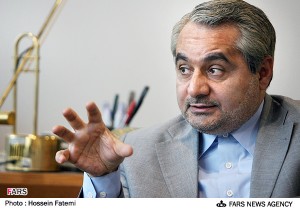 According to Ambassador Seyed Hossein Mousavian, the spokesperson for Iran’s nuclear negotiating team (2003-2005) and now a visiting scholar at Princeton University, an Iranian nuclear weapon “would provide only a short-term regional advantage that would turn into a longer-term vulnerability”.
According to Ambassador Seyed Hossein Mousavian, the spokesperson for Iran’s nuclear negotiating team (2003-2005) and now a visiting scholar at Princeton University, an Iranian nuclear weapon “would provide only a short-term regional advantage that would turn into a longer-term vulnerability”.
Arrested for apparently politically motivated reasons during Mahmoud Ahmadinejad’s presidency, Mousavian has become an important source for many in Washington who want to gauge regime thinking.
Among Mousavian’s top 10 reasons for why Iran doesn’t want a bomb is the desire to avoid North Korea-level isolation and regime survival:
9. Deterrence: A major accusation levied against Iran is that once it acquires nuclear weapons, it will use it against the United States and Israel. This makes no rational sense, since any provocation by Iran against two states that possess thousands and hundreds of nuclear weapons respectively would result in Iran’s total annihilation. Iran has publicly acknowledged this fact.
As always, Mousavian concludes by listing the terms that Iran could agree to for a negotiated settlement over its nuclear program:
]]>Tehran would only accept a deal in which the P5+1 recognizes Iran’s legitimate rights of enrichment under the NPT and gradually lifts the sanctions. In return, to assuage Western worries, Iran would operationalize Ayatollah Khamenei’s fatwa banning nuclear arms, implement the Additional Protocol and the Subsidiary Arrangements (Code 3.1), and cooperate with the IAEA to resolve technical ambiguities and its worries about possible military dimensions. It would also export its enriched uranium stockpile beyond domestic consumption or convert it to fuel rods, cap enrichment at 5 percent, and establish a multilateral consortium for enrichment in Iran.
This package can guarantee Iran’s legitimate NPT rights of enrichment while ensuring that Iran will remain a non-nuclear-weapon state forever.
By Richard Javad Heydarian
A key foreign policy consequence of President Barak Obama’s reelection is the growing possibility of face-to-face talks between the United States. and Iran. Both the US Secretary of State Hillary Clinton and Iran’s Foreign Minister Ali Akbar Salehi have expressed, albeit conditionally, their respective governments’ openness [...]]]>
By Richard Javad Heydarian
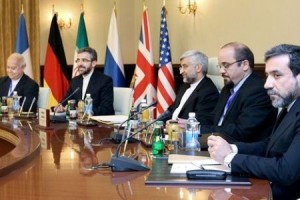 A key foreign policy consequence of President Barak Obama’s reelection is the growing possibility of face-to-face talks between the United States. and Iran. Both the US Secretary of State Hillary Clinton and Iran’s Foreign Minister Ali Akbar Salehi have expressed, albeit conditionally, their respective governments’ openness to engage in comprehensive bilateral talks — for the first time in almost three decades — to primarily resolve the ongoing nuclear standoff.
A key foreign policy consequence of President Barak Obama’s reelection is the growing possibility of face-to-face talks between the United States. and Iran. Both the US Secretary of State Hillary Clinton and Iran’s Foreign Minister Ali Akbar Salehi have expressed, albeit conditionally, their respective governments’ openness to engage in comprehensive bilateral talks — for the first time in almost three decades — to primarily resolve the ongoing nuclear standoff.
Beyond the issue of urgently resolving the Iranian nuclear question, purportedly to prevent an Israeli pre-emptive strike and an Iranian nuclear bomb, the Obama administration’s growing interest in directly engaging Iran may have something to do with timing, opportunity, and leverage.
There is a feeling in Washington that the recent transatlantic sanctions may have created enough pressure — and damage to Iran’s economy — to potentially extract major unilateral concessions from the Iranian regime. Namely, a “stop-shut-ship scenario”, whereby Iran would curb its enrichment capacity, open up all aspects of its nuclear program, shut down its heavily-fortified nuclear facilities, and ship out its stockpile of above 3-5 percent enriched uranium in exchange for some nominal — yet to be clarified — incentives from the West.
Since the imposition of Western sanctions against Iran, beginning in late-2011 and intensifying by mid-2012, the Iranian economy has begun whimpering on an unprecedented scale. Iran’s oil output is at its lowest in more than two decades, while oil exports have been halved; the inflation rate has surpassed the 25 percent barrier, while the budget-deficit is reaching its highest level in the last decade; and, the Iranian currency (rial) has lost about 80 percent of its value in less than a year. The sanctions against Iran’s ports, shipping industry, financial sectors, and central bank, Bank-e-Markazi, have also made it increasingly difficult to conduct even the most benign kind of international transactions, from the import of medicines, to food, diapers and medical equipments.
However, there are some recent indications that Iran’s economy is not exactly in a desperate shape, or at least not as frail and fragile as the Obama administrations hopes it to be.
According to the Paris-based International Energy Agency’s (IEA) most recent report, Iran’s oil exports have rebounded sharply – by around 30 percent – after seven months of steady decline, thanks to new contracts with giant Asian customers, China and South Korea. With oil exports constituting more than three-quarters of export earnings, Tehran is now in a relatively better position to defend its falling currency. In fact, the rial has indeed experienced some recovery in recent weeks, appreciating from the record-low of 37,000 rials against 1 dollar in early October to around 27,000 rials against 1 dollar today. Of course, the most recent financial and hydrocarbon sanctions by the European Union will further complicate the process by which Iran intends to translate its rising exports into a stronger local currency.
Another surprising development is in the tourism sector, which has also experienced an unexpected spike. “Although most sectors of Iran’s economy are struggling and oil revenue has steeply declined, foreign purchasing power is at an all-time high in Iran due to a plunge in the value of the Iranian currency, the rial,” reported Jason Rezaian of the Washington Post.
The Iranian government has circumvented transatlantic sanctions by an ingenious mixture of manifold countermeasures. It has negotiated sovereign insurance deals with major customers such as China, India, Japan, and South Korea, while considering barter deals (sweetened by heavy discounts and flexible payment arrangements) to woo major customers and continue large-scale oil trade. Iran has also expanded its tanker storage capacity by purchasing/building new oil-transporting vessels, smuggled oil through neighboring countries like Iraq, and stealthily transported oil — with off-the-radar and/or or ‘foreign flagged’ ships — from its ports to major destinations in East Asia. This explains Iran’s ability to increase oil exports by almost 30 percent in November, compared to previous months.
Moreover, the government has instituted some draconian measures to stave-off the impact of sanctions. It has further slashed imports, postponed its subsidy cuts, reduced money supply, raised interest rates, and jailed so-called ‘currency manipulators’. It has also encouraged domestic manufacturing. Aside from the government’s recent ban on imports of around 77 luxury products, atop reductions in 52 other non-essential goods, the fall of the Iranian currency — especially in the black market – has also eroded the competitiveness of imported capital goods, which have hammered local producers in recent years.
It’s important to note that the Iranian government has considerable foreign exchange reserves, estimated at between $80-100 billion, giving it significant ability to sustain imports for an extended period and defend its currency amid growing international restrictions. With a multi-tiered foreign exchange system, the government has an ability to cushion the most vulnerable sectors — incidentally, the backbone of the regime – against major disruptions in the import of basic commodities. After all, Iran’s structurally high inflation more the product of a loose monetary policy and major subsidy cuts that begun in 2010.
In some ways, it is Iran’s relative resilience — and ability to avoid a total collapse — that may explain its willingness to explore direct talks with Washington. Tehran feels that it has enough wiggle room to avoid total unilateral concessions and negotiate a more mutually-favorable, face-saving outcome — perhaps, before it’s tool late.
- Richard Javad Heydarian is a Philippine-based foreign affairs analyst, specializing on international security and economics. He can be reached at jrheydarian@gmail.com
]]>From the English language transcript of a VOA interview with Columbia Professor Gary Sick, an acute observer of US-Iranian relations who served on the National Security Council staffs of President Ford, Carter and Reagan:
SD: You’ve presented a deal in which the US agrees to some enrichment [...]]]>
From the English language transcript of a VOA interview with Columbia Professor Gary Sick, an acute observer of US-Iranian relations who served on the National Security Council staffs of President Ford, Carter and Reagan:
SD: You’ve presented a deal in which the US agrees to some enrichment and removes sanctions and Iran agrees to limits and full monitoring of its nuclear program. Do you see any readiness from either side toward this final deal?
GS: I think as with most long running problems the outlines of the solutions are pretty well known. It is not a mystery what would need to be done by either side. The question is really one of political will. Is Iran willing in fact to have private negotiations with the United States, creating an agenda that would then be used for public negotiations? Would the United States officially accept the reality that Iran is enriching and will probably continue to enrich? Again, it’s not so much that these are difficult things to imagine, it’s that they carry very heavy political consequences. For Iran the United States is the Great Satan. It is the enemy. And so by dealing with the United States you undercut that position and that has political consequences in Iran. In the United States Iran is a very unpopular country, there is no support structure in the United States, no constituency for Iran, and so taking a step that is contrary, to say what Israel would like to do is going to have real consequences for the United States politically. So it takes political sacrifice or political courage on each side and over the last 30 some years it has been very unusual to have a time when both parties were actually prepared to exercise that kind of courage. So the solution is there but getting to the solution is much, much harder than just describing it.
(Don’t miss Dr. Sick’s IPS review of Becoming Enemies, a fascinating new book on US policy during the Iran-Iraq war.)
]]>Further to Jim’s post on Secretary of State Hillary Clinton’s explicit statement on Friday that Washington wants bilateral talks with Iran, are similar comments she made on Nov. 30 at the Foreign Policy Group’s “Transformational Trends 2013″ Forum:
QUESTION: Robin Wright.
SECRETARY CLINTON: Hi, Robin.
QUESTION: I want to ask you [...]]]>
Further to Jim’s post on Secretary of State Hillary Clinton’s explicit statement on Friday that Washington wants bilateral talks with Iran, are similar comments she made on Nov. 30 at the Foreign Policy Group’s “Transformational Trends 2013″ Forum:
]]>QUESTION: Robin Wright.
SECRETARY CLINTON: Hi, Robin.
QUESTION: I want to ask you about Iran, and to speak with the same kind of candor you did about Syria. This morning, Dennis Ross said that he thought this year was going to be a decisive year. Apparently, one of the U.S. representatives in Vienna today said that we’re talking about a March deadline – if you could explain that a little bit further.
And tell us realistically what prospects you think there is for compromise with Iran, given the past year of efforts by the United States.
And also, if you believe that Israel is fully on board in letting the United States take the lead and not going off on its own path.
SECRETARY CLINTON: Well, as to the last question, I’m not going to speak to any country’s security decisions other than our own. Obviously, that’s up to Israel to decide. However, I will say that we continue to believe that there is still a window of opportunity to reach some kind of resolution over Iran’s nuclear program. Now, I’m not a wild-eyed optimist about it, but I think it’s imperative that we do everything we can – unilaterally, bilaterally, multilaterally – to test that proposition.
I think what was meant about the March reference was either about the IAEA and its continuing work or the fact that we finished our election and now would be a good time to test the proposition that there can be some good-faith serious negotiations before the Iranians get into their elections, which are going to heat up probably around the March period, heading toward a June election.
I think that it’s a difficult matter to predict, because it really depends upon how serious the Iranians are about making a decision that removes the possibility of their being able to acquire a nuclear weapon or the components of one that can be in effect on a shelf somewhere and still serve as a basis for intimidation.
We get differing reports, as I’m sure you have seen, as to how serious the Supreme Leader is about that, but we want to test the proposition. This President came into office saying he was prepared to engage with Iran, reached out to Iran, without much reciprocity. We put together this unprecedented coalition to impose these very tough sanctions on Iran. We know they’re having an effect internally. But I think that we’ll see in the next few months whether there’s a chance for any kind of a serious negotiation. And right now, I’m not sure that it can happen, but I certainly hope it does.
Former Iran-desk State Department staffer Reza Marashi and journalist Sahar Namazikhah remind us that Iran’s influnetial Ministry of Intelligence and Security (MOIS) has publicly recognized the benefits of negotiating with the US to avert a military conflict through a report that’s available on their website. “To that end, the Intelligence Ministry [...]]]>
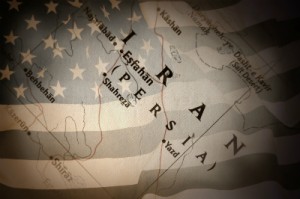 Former Iran-desk State Department staffer Reza Marashi and journalist Sahar Namazikhah remind us that Iran’s influnetial Ministry of Intelligence and Security (MOIS) has publicly recognized the benefits of negotiating with the US to avert a military conflict through a report that’s available on their website. “To that end, the Intelligence Ministry can play a role in planting ideas within the minds of Iran’s top decision-makers,” write Marashi and Namazikhah, adding that the MOIS report directly “articulates why President Obama is different than Israel”:
Former Iran-desk State Department staffer Reza Marashi and journalist Sahar Namazikhah remind us that Iran’s influnetial Ministry of Intelligence and Security (MOIS) has publicly recognized the benefits of negotiating with the US to avert a military conflict through a report that’s available on their website. “To that end, the Intelligence Ministry can play a role in planting ideas within the minds of Iran’s top decision-makers,” write Marashi and Namazikhah, adding that the MOIS report directly “articulates why President Obama is different than Israel”:
The primary obstacle? According to the MOIS, it is Israel – but not for the reasons many might assume. Rather than ideology, Iran’s Intelligence Ministry sees geopolitics as the driving force: “[Israel is concerned that] the balance of power in the region will be against the Zionist regime” and it therefore “considers enrichment a threat to its national security and wants to destroy Iran’s nuclear facilities”.
The way that Iran’s Intelligence Ministry distinguishes between Obama and Israel is important. As a key source of information in the Iranian system, the MOIS has said that Obama shows he is not willing to rush into war – and it has given him de facto credit for it. To that end, policymakers in Washington should carefully study this publication as a potential opening from Iran.
Gary Sick, an acute observer of US-Iranian relations for more than three decades who served on the National Security Council staff under president Ford, Carter and Reagan, meanwhile argues that the path to middle east peace goes through Tehran. But even if conditions are ripe for a serious attempt at reaching a deal — which President Obama seems interested in – both sides will need to make concessions:
The United States and its allies will have to accept a measure of Iranian domestic enrichment of uranium. Iran will have to accept limits on its entire nuclear infrastructure, subject to intrusive inspections and monitoring. Iran will need to document the history of its nuclear program, and the West will need to remove sanctions. All of this must happen in a step-by-step process with safeguards and verifications at each stage.
Writing in Al-Monitor, Banafsheh Keynoush argues that Iran’s hardliners are ready to engage, but won’t submit without serious incentives. Indeed, as Iran scholar Farideh Farhi points out, the key to moving the diplomatic process forward and avoiding a military conflict is flexibility on both sides:
]]>Unless Khamenei and company are given a way out of the mess they have taken Iran into (with some help from the US and company), chances are that we are heading into a war in the same way we headed to war in Iraq. A recent Foreign Affairs article by Ralf Ekeus, the former executive chairman of the UN special Commission on Iraq, and Malfrid-Braut hegghammer, is a good primer on how this could happen.
The reality is that the current sanctions regime does not constitute a stable situation. First, the instability (and instability is different from regime change as we are sadly learning in Syria) it might beget is a constant force for policy re-evaluation on all sides (other members of the P5+1 included). Second, maintaining sanctions require vigilance while egging on the sanctioned regime to become more risk-taking in trying to get around them. This is a formula for war and it will happen if a real effort at compromise is not made. Inflexibility will beget inflexibility.
During his first Press Conference today following his successful second-term campaign, President Barak Obama emphasized that the United States wants to peacefully resolve the tense dispute over the Islamic Republic’s controversial nuclear program (the US is reportedly considering a more-for-more negotiating strategy) but denied that talks are “imminent”. Importantly, he didn’t reject [...]]]>
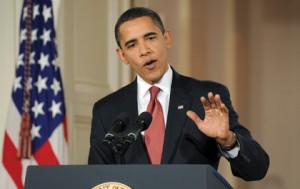 During his first Press Conference today following his successful second-term campaign, President Barak Obama emphasized that the United States wants to peacefully resolve the tense dispute over the Islamic Republic’s controversial nuclear program (the US is reportedly considering a more-for-more negotiating strategy) but denied that talks are “imminent”. Importantly, he didn’t reject the notion of direct talks either:
During his first Press Conference today following his successful second-term campaign, President Barak Obama emphasized that the United States wants to peacefully resolve the tense dispute over the Islamic Republic’s controversial nuclear program (the US is reportedly considering a more-for-more negotiating strategy) but denied that talks are “imminent”. Importantly, he didn’t reject the notion of direct talks either:
PRESIDENT OBAMA: With respect to Iran, I very much want to see a diplomatic resolution to the problem. I was very clear before the campaign, I was clear during the campaign and I’m now clear after the campaign — we’re not going to let Iran get a nuclear weapon. But I think there is still a window of time for us to resolve this diplomatically. We’ve imposed the toughest sanctions in history. It is having an impact on Iran’s economy.
There should be a way in which they can enjoy peaceful nuclear power while still meeting their international obligations and providing clear assurances to the international community that they’re not pursuing a nuclear weapon. And so yes, I will try to make a push in the coming months to see if we can open up a dialogue between Iran and not just us but the international community, to see if we can get this thing resolved. I can’t promise that Iran will walk through the door that they need to walk though, but that would be very much the preferable option.
Q: And the — (inaudible) — conversation picked up?
PRESIDENT OBAMA: I won’t talk about the details of negotiations, but I think it’s fair to say that we want to get this resolved and we’re not going to be constrained by diplomatic niceties or protocols. If Iran is serious about wanting to resolve this, they’ll be in a position to resolve it.
Q: At one point just prior to the election, there was talk that talks might be imminent —
PRESIDENT OBAMA: That was — that was not true, and it’s not — it’s not true as — as of today, OK?
Obama essentially read from the US’ official Iran script, apart from his last comment about moving the process along regardless of “diplomatic niceties or protocols” if Iran wants to sincerely engage. This sounds like a hint to the Iranians that he means business and wants them to put something tangible forward — presumably so he can bring it home to the chorus of anti-diplomacy factions in Congress.
How the Iranians will respond to Obama’s hint is the question, especially considering their own domestic political considerations. Writing in Al-Monitor, Banafsheh Keynoush argues that Iran’s hardliners are ready to engage, but won’t submit without serious incentives. Indeed, as Iran scholar Farideh Farhi points out, the key to moving the diplomatic process forward and avoiding a military conflict is flexibility on both sides:
]]>Unless Khamenei and company are given a way out of the mess they have taken Iran into (with some help from the US and company), chances are that we are heading into a war in the same way we headed to war in Iraq. A recent Foreign Affairs article by Ralf Ekeus, the former executive chairman of the UN special Commission on Iraq, and Malfrid-Braut hegghammer, is a good primer on how this could happen.
The reality is that the current sanctions regime does not constitute a stable situation. First, the instability (and instability is different from regime change as we are sadly learning in Syria) it might beget is a constant force for policy re-evaluation on all sides (other members of the P5+1 included). Second, maintaining sanctions require vigilance while egging on the sanctioned regime to become more risk-taking in trying to get around them. This is a formula for war and it will happen if a real effort at compromise is not made. Inflexibility will beget inflexibility.